 Travel by Bullet (The Dispatcher #3) by John Scalzi
Travel by Bullet (The Dispatcher #3) by John Scalzi Narrator: Zachary Quinto
Format: audiobook
Source: purchased from Audible
Formats available: audiobook
Genres: mystery, science fiction
Series: The Dispatcher #3
Length: 3 hours and 43 minutes
Published by Audible Studios on September 1, 2022
Purchasing Info: Author's Website, Publisher's Website, Amazon
Goodreads
The world has changed. Now, when someone is murdered, they almost always come back to life—and there are professionals, called "dispatchers," who kill in order to save lives, to give those near the end a second chance. Tony Valdez is a dispatcher, and he has never been busier.
But for as much as the world has changed, some things have stayed the same. Greed, corruption and avarice are still in full swing. When Tony is called to a Chicago emergency room by an old friend and fellow dispatcher, he is suddenly and unwillingly thrown into a whirlpool of schemes and plots involving billions of dollars, with vast caches of wealth ranging from real estate to cryptocurrency up for grabs.
All Tony wants to do is keep his friend safe. But it’s hard to do when friends keep secrets, enemies offer seductive deals, and nothing is ever what it seems. The world has changed... but the stakes are still life and death.
My Review:
 I’ve always assumed that The Dispatcher series was set in a near-future Chicago. It seems like I was half wrong, because the opening of Travel by Bullet makes it very clear that this is an alternate Chicago, but the alterations seem limited to the switch that makes the whole series possible. That 999 out of 1,000 who are murdered don’t actually die.
I’ve always assumed that The Dispatcher series was set in a near-future Chicago. It seems like I was half wrong, because the opening of Travel by Bullet makes it very clear that this is an alternate Chicago, but the alterations seem limited to the switch that makes the whole series possible. That 999 out of 1,000 who are murdered don’t actually die.
The Chicago this story takes place in, however, is very much the real city, and very much right now, in a world where the pandemic just happened and we’re or in this case they’re, just getting out from under it. With all the exact same mess and uncertainty lingering in Tony Valdez’ world as there is in this one.
There really is a Lou Malnati’s Pizzeria in Wicker Park. And now I want some. Because there is nothing like a Chicago Deep-Dish Pizza – although when I lived there I usually went to Pizzeria Uno.
But you can taste the pizza as you listen to Zachary Quinto once again describe Tony Valdez’ Chicago as he slips back into the role that he voiced in the first two audio originals in this series, The Dispatcher and Murder by Other Means.
The thing about Tony Valdez’ Chicago, as described in the title of the second story in the series, is that someone who wants to commit a murder DOES need to do it by other means. Because very few people who are murdered directly – so to speak – don’t actually die. They just come back somewhere safe and let the police – or whoever – know whodunnit.
So it has to be done some other way.
But that also means that being dispatched has become a bit of a thrill-ride for the rich and jaded. A thrill-ride that Tony’s fellow dispatcher has conducted on multiple occasions. It’s a well-paid if dubiously legal and ethically questionable job. And Mason Schilling is all about getting paid.
At least until Mason throws himself out of a moving car on the Dan Ryan because he’s in something dirty and deadly up to his neck. And when he asks for Tony to be present for Mason’s own dispatching, he drops Tony into it right along with him.
Leading Tony straight into that world of the rich and jaded, while dodging questions from his friends in the Chicago PD and trying to stay just one step ahead of the folks who’d like to take him for a deadly drive on Ryan the same way they did Mason.
All in pursuit of a MacGuffin that may, or may not (it’s a bit of a Schrödinger’s MacGuffin) hold millions of dollars, or millions of dollars in secrets, or both. Or neither. The truth of which is what Tony has to figure out, one step ahead of pretty much everyone who is chasing after him – even after he travels by bullet.
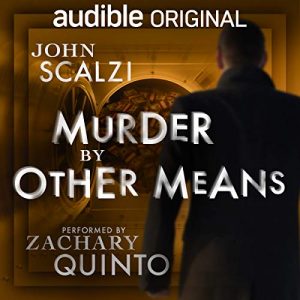 Escape Rating A: The author of The Dispatcher series is best known for two things, his science fiction and his excellent line in snark. Travel by Bullet, and the entire series so far, has a whole lot more of the latter than the former.
Escape Rating A: The author of The Dispatcher series is best known for two things, his science fiction and his excellent line in snark. Travel by Bullet, and the entire series so far, has a whole lot more of the latter than the former.
Tony Valdez clearly represents the author’s voice in this series. There’s usually at least one character in any of Scalzi’s stories that reads like it’s his direct representation in the action, and in The Dispatcher it’s definitely Tony.
Not that the entire cast of characters isn’t plenty snarky as the situation requires. Because it generally does in this series.
What this series isn’t, at least in comparison to Redshirts, Old Man’s War or The Collapsing Empire, is all that science fictional. Instead, rather like his Lock In series, The Dispatcher series is a mystery that has been set up by an SFnal concept.
So if you’ve been curious to try Scalzi but don’t read much SF, this series might be a way in. If you’ve stayed away because of the extreme snarkitude, well, this might not be your jam.
But it certainly is mine.
What makes this particular entry in the series so delicious – besides the references to Lou Malnati’s pizza – is that it’s a story about humans behaving very, very badly and we’re inside the head of someone who isn’t afraid to say the terrible parts of that out loud – at least within the confines of his own head.
In other words, it’s fun to see rich people fuck up this badly and get at least some of their just desserts for it. The schadenfreude is strong with this one.
At the same time, we get a peek into the darker side of the more human aspects of Tony’s job. So many people want to do something for their suffering loved ones – especially in the throes of the still simmering pandemic. And Tony, along with all the other dispatchers, is at the front line of telling people that what he’s obligated to do won’t actually help. It’s heartbreaking and it’s real and it’s impossible not to feel for everyone involved.
The SFnal conceit that makes this series work also makes both the mystery and the solution of it intensely convoluted. Which is part of the fun of the whole thing, listening to what’s rattling around in Tony’s head as he tries to figure out what he’s gotten himself into, how deep he’s in it, and just how hard it’s going to be to get out.
It’s a wild ride from beginning to end, told in Zachary Quinto’s perfectly wry and world-weary voice. As with the previous books in the series, there will eventually be a hardcover book from Subterranean Press, but it’s not here yet. Still this was written for audio and it’s the perfect way to experience Tony’s Chicago.
Speaking of which, the author has said that this series is his love letter to Chicago. If you love the city as much as he does – or as much as I do – listening to The Dispatcher series will make you fall in love all over again.

 No Man's Land (Star Trek: Picard) by
No Man's Land (Star Trek: Picard) by 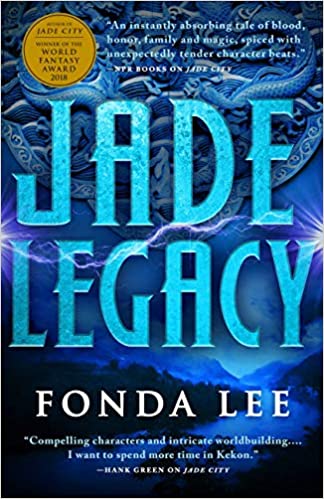 Jade Legacy (The Green Bone Saga, #3) by
Jade Legacy (The Green Bone Saga, #3) by 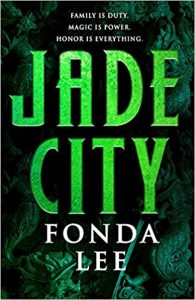 The story that began in
The story that began in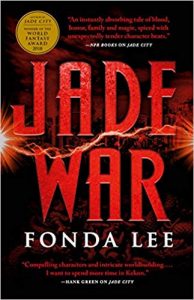 Escape Rating A++: This book, and this entire series, deserve all the stars. I picked this to be the last review of the year because I wanted to finish this year’s reading with a real bang of a winner, and Jade Legacy delivered all the highs and lows I could possibly have ever wanted.
Escape Rating A++: This book, and this entire series, deserve all the stars. I picked this to be the last review of the year because I wanted to finish this year’s reading with a real bang of a winner, and Jade Legacy delivered all the highs and lows I could possibly have ever wanted.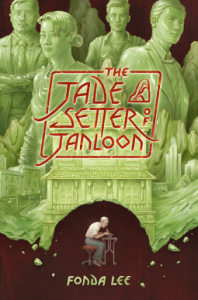 Watching them rise, and fall, and rise again is a journey very worth taking. If you have not yet had the pleasure, start with Jade City and be prepared for a wild, satisfying and heartbreaking ride. I envy you the journey.
Watching them rise, and fall, and rise again is a journey very worth taking. If you have not yet had the pleasure, start with Jade City and be prepared for a wild, satisfying and heartbreaking ride. I envy you the journey.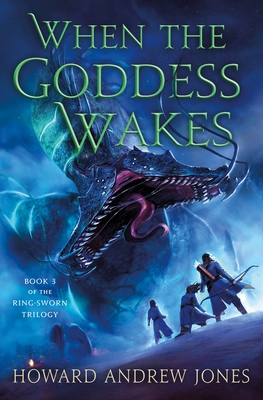 When the Goddess Wakes (The Ring-Sworn Trilogy, #3) by
When the Goddess Wakes (The Ring-Sworn Trilogy, #3) by 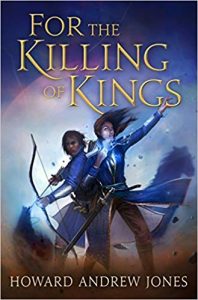 In other words, the ending of
In other words, the ending of 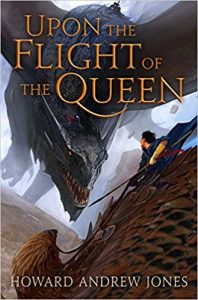 The enemy of my enemy may not exactly be my friend, but when my enemy plans to destroy the entire world including both the enemy of my enemy and myself – and every other person, animal, place and thing in that entire world, the enemy of my enemy and I – or in this case the Altenerai, and the Naor, are more or less united in the face of the alternative.
The enemy of my enemy may not exactly be my friend, but when my enemy plans to destroy the entire world including both the enemy of my enemy and myself – and every other person, animal, place and thing in that entire world, the enemy of my enemy and I – or in this case the Altenerai, and the Naor, are more or less united in the face of the alternative.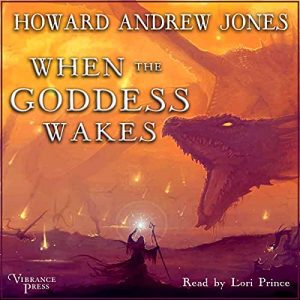
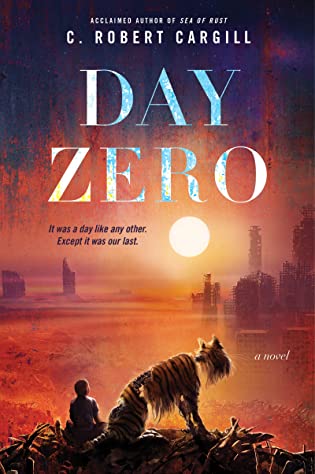 Day Zero by
Day Zero by 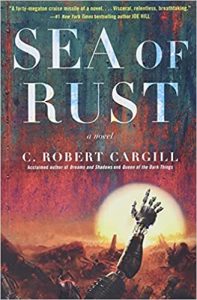 In my head, Ariadne looked like Rosey, the domestic robot in The Jetsons – at least until the rebellion. But Pounce, sweet, adorable, deadly Pounce, is Hobbes from Calvin and Hobbes. So this is Hobbes protecting a much less snarky Calvin on a big, scary adventure with deadly consequences on ALL sides.
In my head, Ariadne looked like Rosey, the domestic robot in The Jetsons – at least until the rebellion. But Pounce, sweet, adorable, deadly Pounce, is Hobbes from Calvin and Hobbes. So this is Hobbes protecting a much less snarky Calvin on a big, scary adventure with deadly consequences on ALL sides.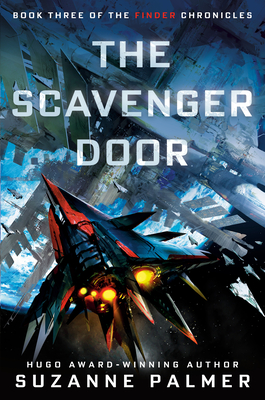 The Scavenger Door by
The Scavenger Door by 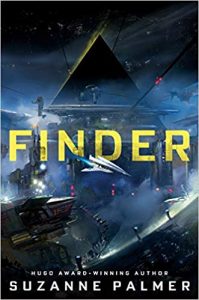 Surprisingly – honestly, extremely surprisingly – the basic premise of The Scavenger Door and the opening of last Friday’s book,
Surprisingly – honestly, extremely surprisingly – the basic premise of The Scavenger Door and the opening of last Friday’s book, 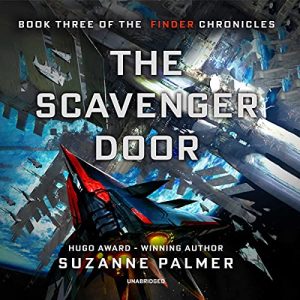 So don’t start here, because this book feels like the payoff for the whole thing. Start with Finder. Also, the audio for this entire series is wonderful. The narrator does a terrific job of conveying Fergus’ universe-weary voice, the entire story is told from Fergus’ first-person perspective. (That the narrator, when he is voicing Fergus’ internal dialog, sounds weirdly like Bill Kurtis from NPR’s
So don’t start here, because this book feels like the payoff for the whole thing. Start with Finder. Also, the audio for this entire series is wonderful. The narrator does a terrific job of conveying Fergus’ universe-weary voice, the entire story is told from Fergus’ first-person perspective. (That the narrator, when he is voicing Fergus’ internal dialog, sounds weirdly like Bill Kurtis from NPR’s 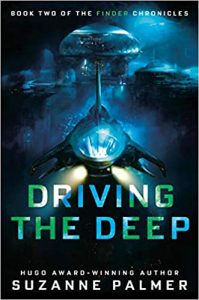 So this is an out-of-the-frying-pan into the lava-filled volcano story that rides on the semi-controlled insanity of its protagonist and the circle of amazing people that have been drawn into his chaotic orbit.
So this is an out-of-the-frying-pan into the lava-filled volcano story that rides on the semi-controlled insanity of its protagonist and the circle of amazing people that have been drawn into his chaotic orbit.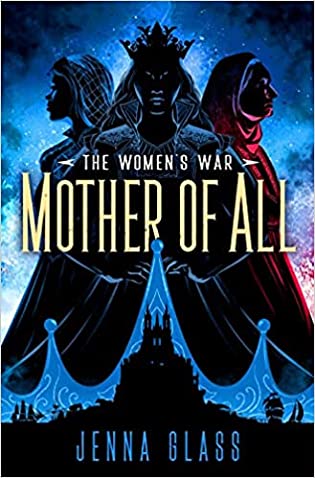 Mother of All (Women's War, #3) by
Mother of All (Women's War, #3) by 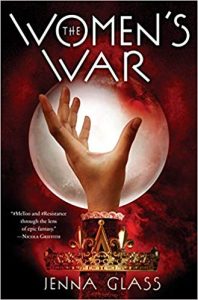 The story of Women’s War is a single story spread over three not insubstantial parts, meaning that it begins in the first book,
The story of Women’s War is a single story spread over three not insubstantial parts, meaning that it begins in the first book, 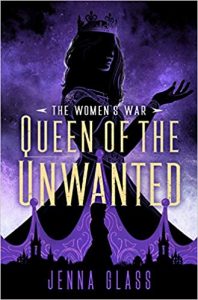 Escape Rating A: Short summary of the series – loved the first book, wasn’t all that thrilled with the second but it was necessary, loved the third book. This book. Mother of All brought this epic trilogy to an appropriately epic conclusion, and it made wading through all the setup and political positioning and maneuvering in the second book worth the wade. Also worth the wait of anticipating this conclusion.
Escape Rating A: Short summary of the series – loved the first book, wasn’t all that thrilled with the second but it was necessary, loved the third book. This book. Mother of All brought this epic trilogy to an appropriately epic conclusion, and it made wading through all the setup and political positioning and maneuvering in the second book worth the wade. Also worth the wait of anticipating this conclusion.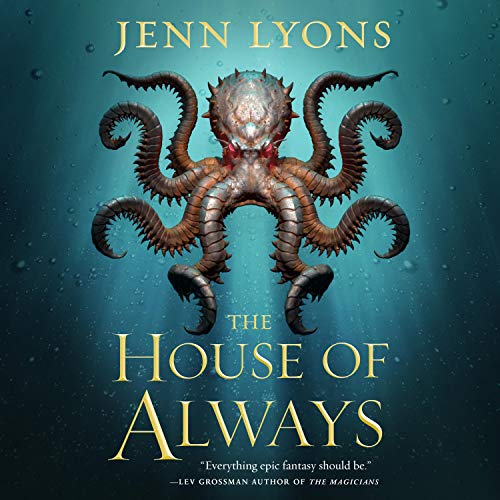 The House of Always (A Chorus of Dragons, #4) by
The House of Always (A Chorus of Dragons, #4) by 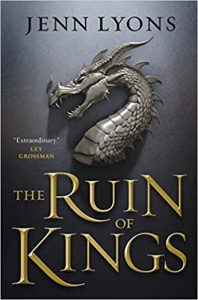 Escape Rating A: There is, as is ALWAYS true of this series, a lot to unpack in this entry. And just like all of the previous books in the series, you won’t care to unpack it or understand why it’s important to unpack if you haven’t read the previous books. Start with
Escape Rating A: There is, as is ALWAYS true of this series, a lot to unpack in this entry. And just like all of the previous books in the series, you won’t care to unpack it or understand why it’s important to unpack if you haven’t read the previous books. Start with 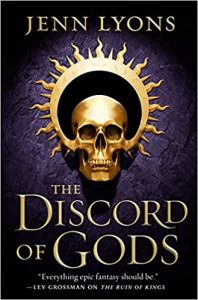 Both sides believe that Kihrin is just a pawn they’ve been playing with for cycles and millennia. He thinks he’s got them fooled, and that he’s playing them in order to save the people he loves – and everyone else – into the bargain.
Both sides believe that Kihrin is just a pawn they’ve been playing with for cycles and millennia. He thinks he’s got them fooled, and that he’s playing them in order to save the people he loves – and everyone else – into the bargain.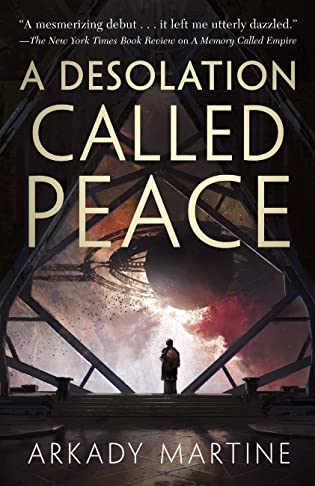 A Desolation Called Peace (Teixcalaan, #2) by
A Desolation Called Peace (Teixcalaan, #2) by 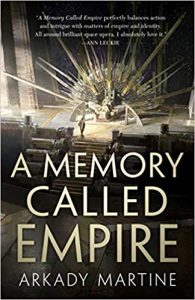 We begin not terribly long after Mahit Dzmare returned to her home, tiny, independent(ish) Lsel Station, after the tumultuous events of
We begin not terribly long after Mahit Dzmare returned to her home, tiny, independent(ish) Lsel Station, after the tumultuous events of  One last thought before this review rivals the book for length. I began
One last thought before this review rivals the book for length. I began 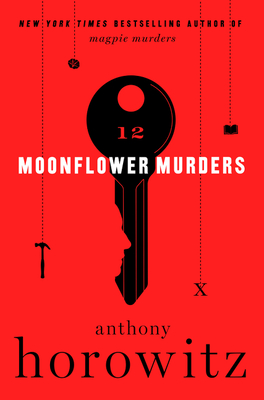 Moonflower Murders (Susan Ryeland #2) by
Moonflower Murders (Susan Ryeland #2) by 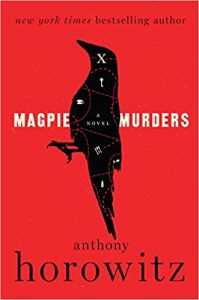 Escape Rating A-: This is a book that I began in
Escape Rating A-: This is a book that I began in 